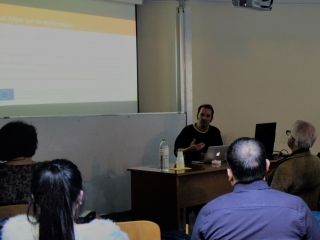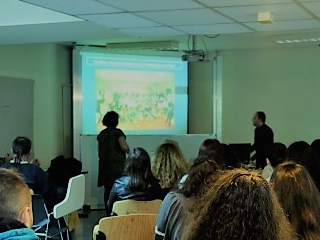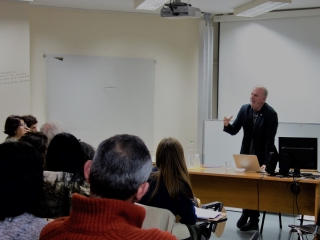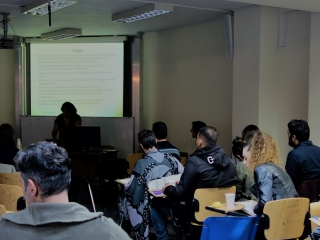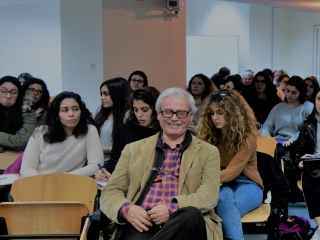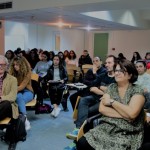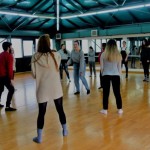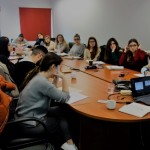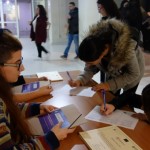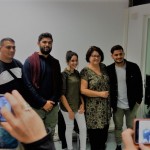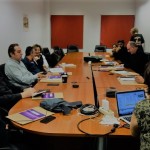4th Newsletter
- Written by Cospirom Administrator
- Published in CoSpIRom News
- Permalink
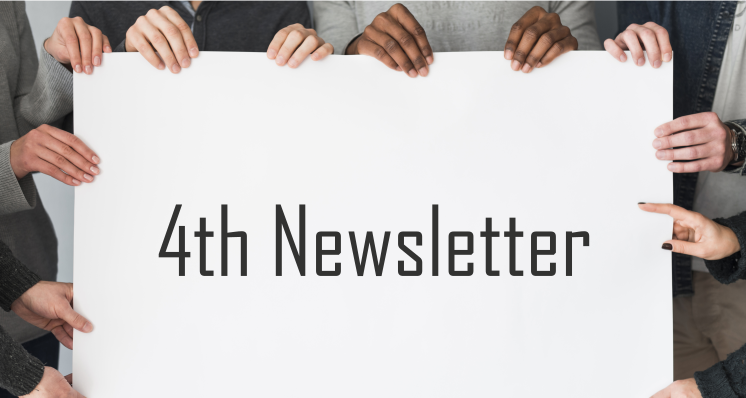
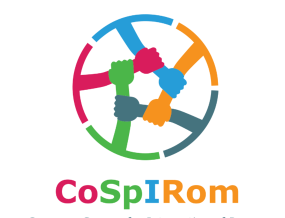
Dear CoSpIRom Friend,
This is our 4th Newsletter to let you know about the actions we have completed during the fourth phase of the project.
Issue #4: Actions and tasks completed (July 2020-February 2021)
- Creation of Murals (July-October 2020)
The Mural-1, in the “Foro Boario” of Lucca, depicts Sara la Nera – Sarah-la-Kali, first queen and patron saint of the Roma. On the seashore she awaits the arrival of the two (or perhaps three) Marys at Sainte Marie de la Mer, in Provence. The flamingos in the background, nomadic animals, are a reference to the Camargue, as well as to the nomadism of the Roma and Sinti populations who are deeply linked to this region. The Mural-2 and the Mural-3, on the walls of the primary school in Rosignano Marittimo (Province of Livorno) were made in collaboration with and among the (Roma and non-Roma) pupils themselves, who also guided the choice of their subject. The message that the pupils wanted to convey was that of inclusion, through simple images that can be easily understood by everyone, even and especially by children attending the school now and in the future.



In Romania, initially the planning for creating the murals was for March-April 2020, but due to the start of the pandemic and the emergency state that Romania was in, the works had to be postponed. The work was resumed in September 2020 and starting with October 16, 2020, two large murals, totalling approximately 500 square meters, beautify the buildings of two schools in Timisoara: Gymnasium School no. 1 (located on 3 Comănești Street, in Traian Area, being also the location where the workshops with Roma and non-Roma parents and children were organised) and the “Grigore Moisil” Theoretical High School (located on 4 Ghirlandei Street, in Bălcescu Square, being a central and highly visible location in Timișoara). The two works of art were made by the well-known local artists Corina Nani and Flavius Rouă. The message evoked by the two murals refers to the need to overcome, in interaction with our peers, the prescribed limits of stereotypes and cultural patterns and awareness of the power of each of us to design a symbolic space, harmony and social cohesion, in which focus on the things that bring us together and make us feel part of the community. Both works had very good reactions in press, on social media and from the local representatives of Timișoara. The message evoked by the two murals refers to the need to overcome, in interaction with our peers, the prescribed limits of stereotypes and cultural patterns and awareness of the power of each of us to design a symbolic space, harmony and social cohesion, in which focus on the things that bring us together and make us feel part of the community. Both works had very good reactions in press, on social media and from the local representatives of Timișoara.


- Common spaces with Roma and non-Roma students and parents (February-March 2020):
In Greece, the 5 workshops with Roma and Police aim at: a) facilitation of Roma to become aware of their rights and obligations, b) empowerment of Roma through this of equal participation contacts, and c) mitigation stereotypes of Roma in the part of Police. The meetings (common spaces) took place in the Police building that is adjacent to Roma neighborhood. In each one of these meetings participated: the members of the research team, 2-5 police officers and 5-7 young Roma. In this common space of young Roma and police officers, both parts had the opportunity to share their experience and to cultivate their empathy for the other while they renegotiated their stereotypes and bias. In Italy, the five workshops (three hours each) were held at the Educational and Didactic Resources Center of the city of Lucca, in July 2020, in presence. Participants: 4 officers of different Police sectors, 6 young Roma and Sinti citizens, 2 educators, 2 social psychologists, project team members. Workshops 1-3 had the main objective of creating “team building” and bonds of knowledge based on an “authentic” contact, while workshops 4 and 5, focused on the “Problem solving” of the relationship between life in the Roma camp and daily contacts with the police.

In Romania, due to the national regulations regarding the gatherings in the context of the COVID-19 pandemic, the workshop sessions were held online, using the Google Meet platform. The series of workshops was organized with a weekly frequency, for five weeks, starting with 22 October 2020, in the same interval (10 a.m. to 1 p.m.) and finished on 19 November 2020. Each session was attended by representatives of the Association of Young Roma from Timișoara and of the Police Inspectorate of Timiș county. Collaboration agreements were signed with each of the organizations involved. Also, each organization nominated the representatived that attended the meetings. The aim of the sessions was to improve participants’ skills in intercultural communication and critical thinking, as well as to stimulate reflections on how certain patterns of thinking and action absorbed in the culturalization process are reflected on the quality of interaction between community members, leading to formation of stereotypes, prejudices and discriminatory behaviors. Also, the workshops aimed at enhancing the awareness about Roma citizens’ rights and obligations, the need to empower young Roma for equal participation adn to mitigate the negative stereotypes about Roma culture and the persons from this ethnic group. The participants showed a lot of openness to the proposed topics, being willing to share thematic examples from their own experience, as well as other people known to them (family members, friends, etc.).
- Common spaces with young Roma prisoners and prospective teachers in Romania (October 2020 – January 2021):
The activity was initially planned to be implemented in March – May 2020, at the headquarters of the Buziaş Educational Center in Buziaş town, Timis county, by two Researchers and trainers of WUT – Baciu Elena-Loreni and Loredana Trancă – and 17 volunteer students from the Faculty of Sociology and Psychology, Department of Social Work together with the young Roma sentenced to prison in Buzias Center. The purpose of the workshops was to enable participants (students and young Roma prisoners) to co-create common spaces of shared meanings and direct intercultural experiences meant to dissolve the symbolic boundries between Roma and non-Roma cultures. However, due to COVID-19 pandemic, the Romanian National Authorities released a series of Orders, among which the closure of detention centers. The activity was postponed for October. Due to the fact that, in October, the detention centers were still closed, we decided, at the recommendation of our partner (Buzias Educational Centre) to organize the workshops in an on-line format, using Zoom platform. The 6 workshops were organized between 23rd of October 2020 and 8th of January 2021, each session with a duration of 3 hours, and were attended by the 17 volunteer students enrolled in the project and between 6 and 10 young Roma prisoners. The topics covered during the workshops were: 1. Let’s get to know each other, 2. Halloween, 3. Music and dance, 4. Emotions and feelings: Goodwill and tolerance, 5. Places, things and activities that I like, 6. The Treasure Box – January 8, 2021.
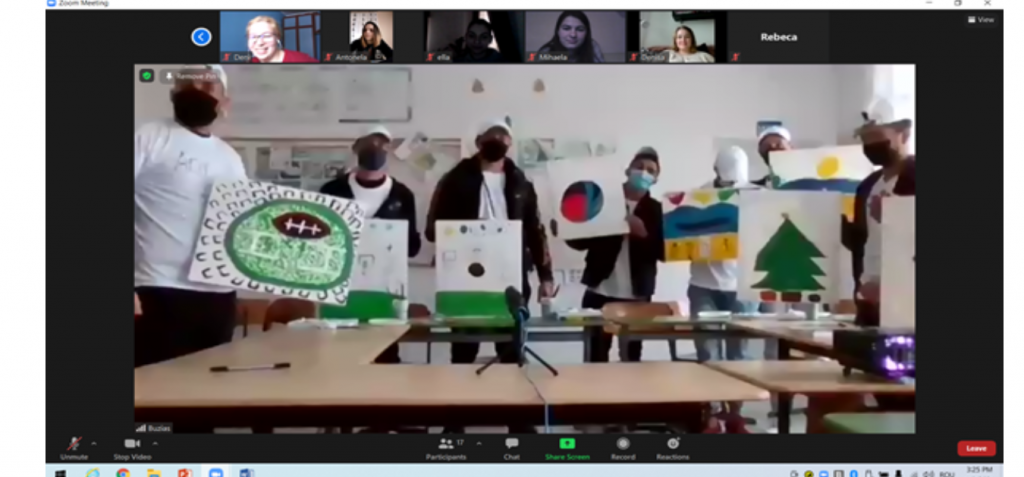
As a result of these workshops the students and the young Roma prisoners developed close relationships and acquired knowledge, competences and values on interculturality, co-creation of shared understandings, equal opportunities and anti-discrimination.
- Local roundtable 2 (November 2020 – January 2021):
In Greece, the 2nd Local roundtable took place virtually on November 19, 2020, and was attended by about 90 -100 people. In the first part of the roundtable the research team presented the objectives and the justification of CoSpIRom ideas, the conceptual framework of the project and the activities implemented in prison; the prospective teachers and young Roma prisoners shared their experience of participating in these common spaces; prison officers and teachers at the prison school pointed out the importance of actions that bridge insiders (young prisoners) and outside (prospective teachers). In the second part stakeholders: the Secretariat for social solidarity and poverty alleviation; a representative of general secretariat for anti-crime policy; the regional director of education; the organizing director of PEKES of Thessaly; a representative of the General Secretariat for Vocational Education; Training and Lifelong Learning provided their perspectives as well as their organizations’ actions regarding prison/prison education. The roundtable was completed with open discussion providing the opportunity to all participants make questions or share thoughts and perspectives. The need for collaboration and synergy of all services that are involved in prison/prison education as well as the need of actions with continuity in the time it was emerged as very crucial.

In Italy, the Local Roundtable 2 “Training activities in prisons from an intercultural perspective” took place online on January 30th, 2021. The main topics introduced and discussed were the outcomes of the CoSpIRom project activities aimed at creation of common spaces with young Roma prisoners. Some 100 people participated in the roundtable, a few of them entering the lively discussion. In particular, the role of Universities in the training of future teachers in intercutural dialogue and relations with citizens belonging to socially marginalized categories, such as Roma and, above all, Roma ex-prisoners, was discussed. Another topic of discussion was the need, positively identified in the CoSpIRom project, to create the conditions for establishing a dialogue that allows the creation of open spaces for young Roma inside and outside prisons.
- Common space with Roma prisoners & police/prison officers (November 2020-January 2021):
In Greece, common space with young Roma prisoners and police aimed to deal with the problem that face young Roma, since they carry the stigma of a marginalized group and the same time that of imprisoning. The first three meetings with young Roma prisoners and police officers occurred virtual. The last two, the one with police officers and the other with prison staff took place live being arranged in a cycle.
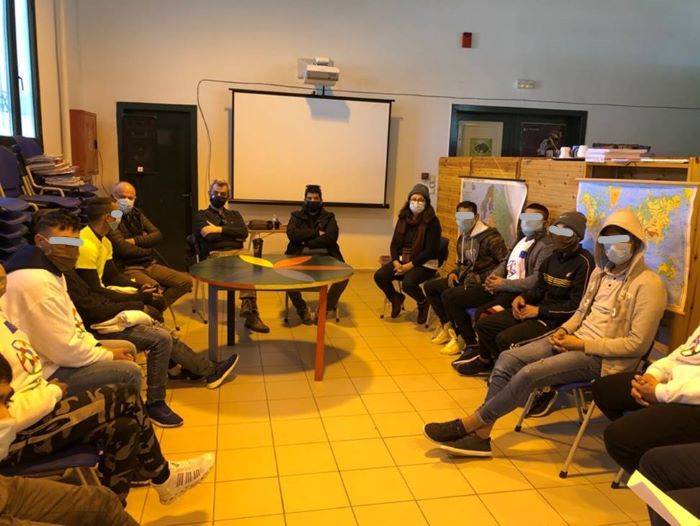
In each one of these meetings participated: the members of the research team, 2-3 police officers and 9-13 young Roma prisoners (including some refugees). This common space gave the opportunity to all participants to come closer and to go forward one step towards breaking stereotypes on both sides, as it was recognized by all participants.
In Italy, the five workshops with Police & young Roma prisoners took place online in November 2020 and were attended by three police officers, six young Roma prisoners in the detention centre of Lucca, two educators and a member of the project team. The workshops were developed in an intercultural spirit to find a model to improve communication between the two parts.
- 2nd Advocacy meeting (December 2020):
The 2nd advocacy meeting has been implemented in a hybrid way due to the pandemic. Part of journalists, research team, and all the young Roma met in the space of University of Thessaly (Greece) while the rest participants connected via WebEx platform. In this meeting participated apart of the research team of UTH, the representative of KEKPA-DIEK, 5 people of local and national media, 6 young Roma (one of them a girl). A short video (https://www.youtube.com/watch?v=zLbhQvYohp4&t=2s) that was prepared by young Roma, under our support, was introduced to the participants for opening the discussion. In this video, the reaction of young Roma on the way MEDIA present several aspects of their life it was depicted.
MEDIA people, being affected by the video, asked the young Roma about the way they desire to be presented by them either is about a positive or negative case. The meeting finished with a brainstorming for developing a manifesto for MEDIA people aiming for reconsideration of their practices regarding the way they present and represent Roma.

In Romania, due to the pandemic context, the Second Advocacy meeting was organized by the West University of Timisoara, as an extended media promotion campaign after the completion of the two large murals in Timișoara, and aimed to promote the anti-discrimination and social inclusion message of the project, based also on the ideas shared by the Roma participants with the project team members, during the activities previously organized within the project. The actions undertaken were: a) the creation and dissemination of a press release announcing the completion of the two murals, with the description of the symbolic message of the two artistic works about inclusion and anti-discrimination, based on the feedback of the participants to the activities within the project; and b) participation to a TV show (Access Regional) broadcasted by the regional station of the Romanian National Television to present the activities of the project and discuss the themes of diversity, anti-discriminatory practices and the social inclusion of vulnerable groups, that have been the pillars of the project activities. The media exposure was very beneficial to the project activities, and allowed us to disseminate the message regarding the need to develop common spaces for people from diverse backgrounds, dismantle the symbolic boundaries prescribed by stereotypes and further continue the promotion of anti-discrimination and social inclusion of Roma persons. The message of the project was picked up by media and social media, and further disseminated, reaching a large number of media entities from regional and national level, as well as their public. Materials about the project and its symbolic messages were also disseminated via social media.
- Common space with Roma and non-Roma parents and students (December 2020 – January 2021):
In Greece, the purpose of these ten workshops was to create commonplace between Roma and non-Roma parents and children with narratives. The narratives function as a bridge of intercultural communication and exchange, where the participants discover the common places between their views and especially between their personal experiences. In such a context, narratives are cultural crossroads that contribute to the development of intercultural approach and empathy. After the implementation of the first two live workshops (February 2020), due to quarantine of COVID, the remaining eight workshops were conducted digitally (December-January 2020) via Skype. Despite the difficulties created by the quarantine treaty, the participation of Roma and non-Roma parents and children in narrative workshops was systematic showing the need for communication between the members of the two groups. The workshops helped the acquaintance and the development of intercultural communication between the participants, highlighting a series of common places both in views and in needs, desires, expectations, fears and thoughts. At the same time, the participation of both adults and minors acted as an intergenerational bridge, through which the transfer of experiences from older to younger was achieved. In this way, the workshops functioned as multiple common meeting places: meeting of cultures, meeting of generations, meeting of university and community, meeting of artists and students.
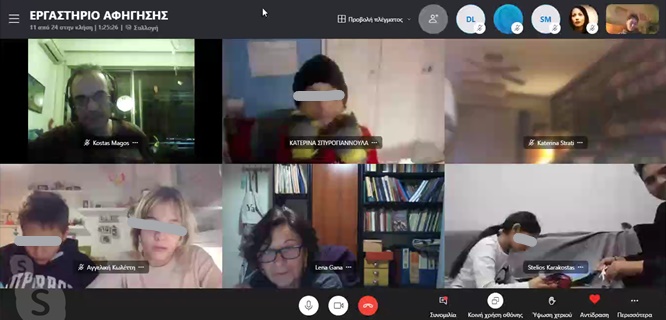
In Italy, the workshops for Roma and non-Roma parents and pupils, due to the covid-19 pandemic could not be held until January and February 2021. They were held in the “Carlo del Prete” primary school in Lucca and in the “Europa” primary school in Rosignano Marittimo, province of Livorno. More than 100 Roma and non-Roma students and parents participated in the workshops, with the presence of more than 30 teachers and trainers. The issue of inclusion was addressed in various contexts: in class dynamics, in peer groups, in relationships with siblings, in relation to different people or little-known situations. For the pupils, the meetings were also an opportunity to acknowledge, with the collaboration of the teachers, some fears towards the different, as well as the fear of being excluded from the group, with reference to possible conflicts and practices of exclusion. As a method of intervention, the narration of experiences directly lived by Roma and non-Roma pupils and parents was privileged, as well as the vision and content analysis of some audio-visuals, in particular clips taken from cartoons. The mediated and updated reconstruction of the selected stories aroused in the participants’ empathic approach that favoured the sharing and discussion in class of urgent, sometimes delicate, topics.
- Manifesto (January 2021):
Research team developed a manifesto for Media and distributed it to young Roma and MEDIA people. The Manifesto entitled “Roma News Broad(en)cast: A manifesto for Media – Rethinking practices of Roma news production & broadcast” came out as a product of the interaction between young Roma, people of the media and the research team after the advocacy meetings that took place in each partner’s country. Local experiences exchanged amongst partners resulted to the final form. This Manifesto, motivating for rethinking practice of elaborating and broadcasting news about Roma people, is aiming to operate as a roadmap that could potentially raise awareness among people who are involved in dissemination news and the media, in order to avoid the reproduction of stereotypical ideas about them and help to create social conditions justice.
• Celebration event (January-February 2021):
In Greece, instead of a live celebration event (due to COVID-19 restrictions) we organized a virtual meeting, the main part of which was a short film; a film created by Roma and non-Roma students in collaboration with the animators. The film captures commonplaces in views and in personal experiences among students that emerged during the narration workshops. The film is available at the link: https://www.youtube.com/watch?v=Q3-rnBMFrdM&feature=share. In the beginning of the celebration event, there was a brief reference about the objectives of the CoSpIRom and the Common Spaces provided through the project’s planned actions. Subsequently, the University team members presented aspects of the intercultural affordance of the narration as common experiential communicative tool for all humans and the potential provided by the narrative workshops for the establishment of common spaces and equal interactions. Finally, participants watched the video produced and students shared their experience from their participation in the common space with Roma and non-Roma parents and students. In Italy, at the end of the workshops for Roma and non-Roma parents and pupils, more than 100 Roma and non-Roma students (in presence) and parents (online) participated in the Celebration Event, that took place on 10 February 2021, with the presence of more than 30 teachers and trainers of the “Carlo del Prete” primary school in Lucca and the “Europa” primary school in Rosignano Marittimo, province of Livorno. Journalists and political representatives of the municipalities attended (online) the event too. The Roma and non-Roma students had prepared the materials to be presented on the occasion of the Celebration Event: drawings, poems and short texts that referred to the topics covered during the workshops, social and educational inclusion, antidiscrimination, fight against stereotypes…The parents, namely the mothers, were involved in making culinary recipes characteristic of the culture which they belong to, in particular of the Roma tradition. In the primary school of Lucca many of these materials, presented on the occasion of the celebration event, were collected in a video in which they were accompanied by music and commented narration of a novel belonging to the cultural tradition of Eastern Europe and rich in educational messages. In Romania, the event was held at the beginning of 2021, on January 29th, starting with 6:00 p.m. The celebration was organized as a livestream event on the Facebook platform and was hosted by the Facebook page of the Faculty of Sociology and Psychology of the West University of Timisoara. The event lasted approx. 2 hours, was designed in the fashion of a TV show, and consisted in: the presentation of the project; the presentation of the activities within the WP3; a video montage with presentation of the murals and testimonials from the representatives of the two schools that were the „beneficiaries” of the two murals, the children/students involved in the activities and the volunteers that helped with the implementation of the activities; interviews with some of the experts that organized the workshops and one of the artists that created the two murals; a musical performance provided by an instrumental band and various artists which interpreted some traditional Roma songs, but also contemporary music. During its 2 hours’ livestream duration, the event gathered over 1.000 views, but its popularity continues to raise, while it is still available of the Facebook page of the Faculty of Sociology and Psychology of the West University of Timisoara. The livestream of the event can be accessed at the following address: https://www.facebook.com/fsp.uvt/videos/3343604679077527 or directly on the Facebook page of the Faculty of Sociology and Psychology at https://www.facebook.com/fsp.uvt/.
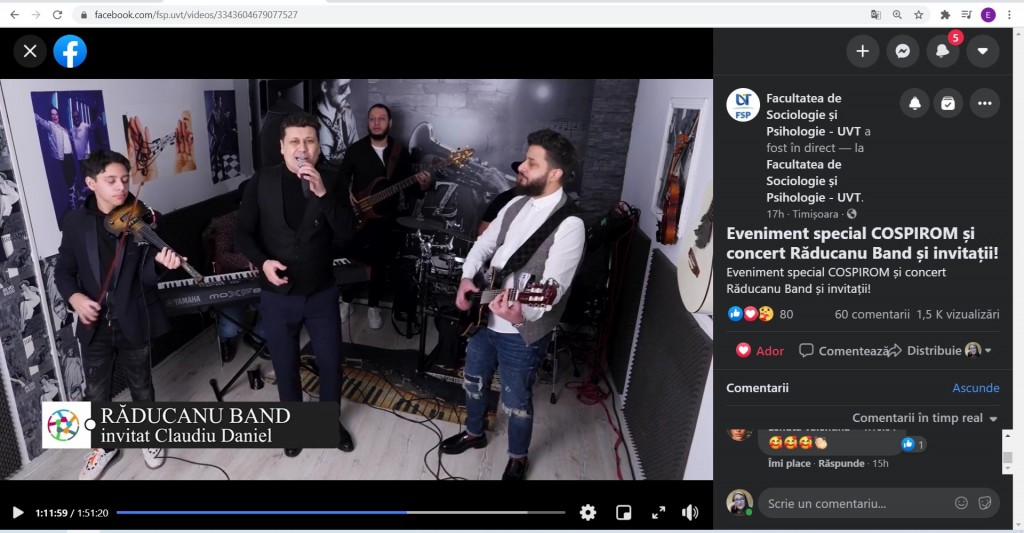
• Local Roundtable 1 (January-February 2021):
In Greece, the Local Roundtable 1 was designed to take place in the city museum of Volos but due to Covid-19 restrictions, it was virtually realized. The 105 participants that attended the event are mostly Roma and non-Roma students and parents, teachers, students/prospective teachers, academics, media, stakeholders, education stakeholders, local people, and project team members. The main subject of the Local Roundtable 1 was to discuss the experience of common spaces with Roma and non-Roma students and parents. Firstly, clarifying questions about the workshops and the film were made. Then the discussion moved to the issue of Roma integration. Among other issues, participants highlighted the fact of limited access in digital sources as an obstacle of participating in distance learning and a fruitful discussion was made. In conclusion, it was common understanding that during the pandemic restrictions the social/education between Roma and non-Roma gap was enlarged.
In Italy, the Local Roundtable 1 took place online on February 10th, 2021. Approximately 100 people participated in the roundtable, a few of them entering the discussion. The main topics introduced and discussed were the impact of the CoSpIRom project on the territorial context of reference for the school, the educational issues concerning Roma and Sinti citizens living in the area, the basic characteristics of Roma culture, the messages conveyed by the murals, the relevance of inter-culturalism for the youth education.
In Romania, the Roundtable 1 was organised with first year students from the specialisations Pedagogy, Special Psychopedagogy and Pedagogy for primary schools and kindergarten (prospective teachers) within the West University of Timișoara. The purpose of the event was to present the experience of common spaces with Roma and non Roma students and parents (D3.4) that has taken place previously and openly discuss with the students about potential replication of the activities, in their future career as teachers. The two-hour event was organised online (due to the conditions imposed by the COVID-19 pandemic) and consisted in discussions on inclusive education and experience sharing on good practices for working with vulnerable and disadvantaged groups, such as poor Roma communities.
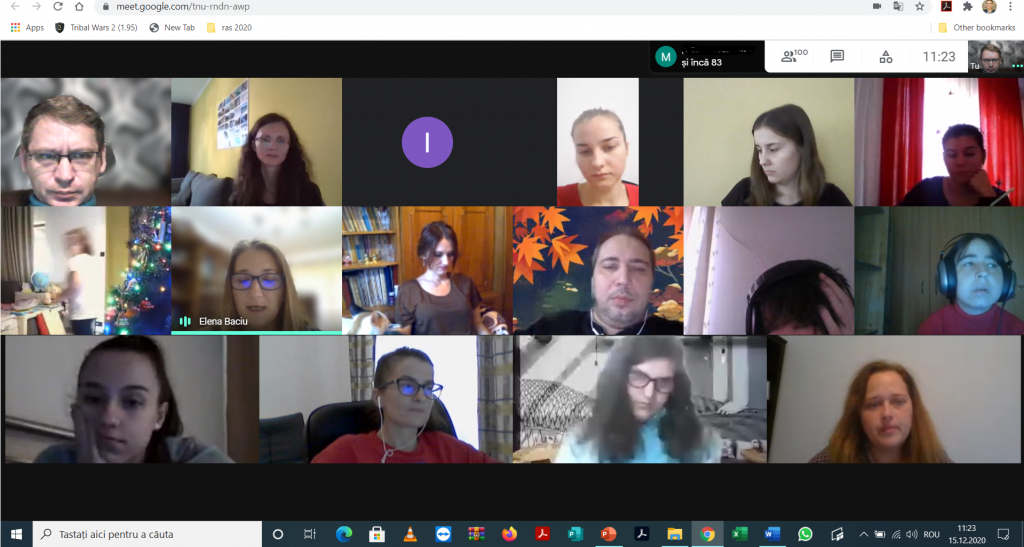
• 3rd Advocacy meeting (February 2021):
In Greece, on February 6, 2021 the third advocacy meeting was implemented, via WebEx platform with the participation of the research team, people of local and national media and young Roma. The aim of the last advocacy meeting was the development of a manifesto for media, as a means to help media people to rethink their practices regarding the way they present and represent Roma. The final product came out as a result of the collaboration—equal participation—among the participants depicting and synthesizing the perspective of each part. The manifesto aims for inspiring media people to rethink their role in reproduction of Roma stereotypes. In Italy, due to the Covid-19 pandemic, the 3rd Advocacy Meeting was held online, on 10 February 2021. The meeting had the purpose of presenting not only the main outcomes of the project, but above all the Manifesto, prepared as a part of the CoSpIRom project products, on challenging the reproduction, above all by the media, of stereotypes on citizens of the Roma / Sinti ethnicity. The meeting was widely participated by University students and teaching staff, trainers, educators, media, law enforcement representatives, stakeholders in the field of educational and social inclusion. The discussion had a lively development, with particular attention given to the last issue of the Manifesto which highlights the risk on the part of the media to focus and reduce attention on the exotic aspects of news regarding Roma.

In Romania, the Third Advocacy meeting was organized by the West University of Timisoara, as an on-line event, and aimed to promote the anti-discrimination and social inclusion message of the project, based also on the ideas shared by the Roma participants with the project team members, during the activities previously organized within the project. Also, the event aimed to collect feedback from the participants about the content of the Manifesto. The event took place on February 10th 2021, and was attended by 10 participants (3 young Roma, 6 press representatives and 1 representative of the Timis county Prefecture) and two members of the project team. During the entire meeting, the participants interacted and discussed the content of the manifesto, as well as their direct experiences with the elaboration and dissemination of news with and about Roma people. The barriers and facilitators of a more accountable and involved media were discussed as well as possible future actions to support the social inclusion of Roma persons and reduce discriminative and marginalizing stereotypes and behaviors.
• Handbook for policy officers (February 2021):
In the framework of CoSpIRom a handbook, promoting the need of reconsidering practices of whom are involved with Roma people, was created. Namely, the handbook is addressed to those involved with Roma policy making and stakeholders that deal and serve Roma people—in local or national level. Its development has been based on the principles of social justice –with emphasis to respond to needs dictated for Roma integration– while pragmatological material deriving from the implementation of the CoSpIRom’s actions enriched it.
• Closing Conference (February 2021):
In Italy, the Closing Conference took place online on February 24th, 2021. Approximately 100 people participated in the roundtable, a few of them entering the discussion. The main objectives of the project and the actions taken in Italy to create the conditions so that common spaces could be created were presented. The presentation of the main results of the project was followed by the interventions of some educators and stakeholders, who accepted the invitation of the project team to evaluate the possibility of developments of the project and expressed their great interest in collaborating in possible future actions aimed at deepening the issues related to the Roma and their inclusion. In particular, strong interest and willingness to collaborate was declared by the president of the UCRI – Unione delle Comunità Romanès in Italia (Union of the Roma Communities in Italy). In Romania, the closing conference was organized by the West University of Timisoara on 26 February, 2021. It aimed to promote the activities of the project and disseminate its results. The purpose of the event was to present the experience of „common spaces” with Roma and non Roma project beneficiaries and to describe the various contexts of implementation of the project and the results obtained in these contexts. The participants were members of the project team, representatives of the local stakeholders (Police, Buzias Educational center, organizations and institutions at local and regional level working with persons from disadvantaged groups), the volunteers that participated in the project and other students of the West University of Timisoara. The event was organised online (due to the conditions imposed by the COVID-19 pandemic) and consisted in presentations organized for each type of target group. The last part of the event consisted in a „Q and A” section. A total of 102 persons attended the conference.
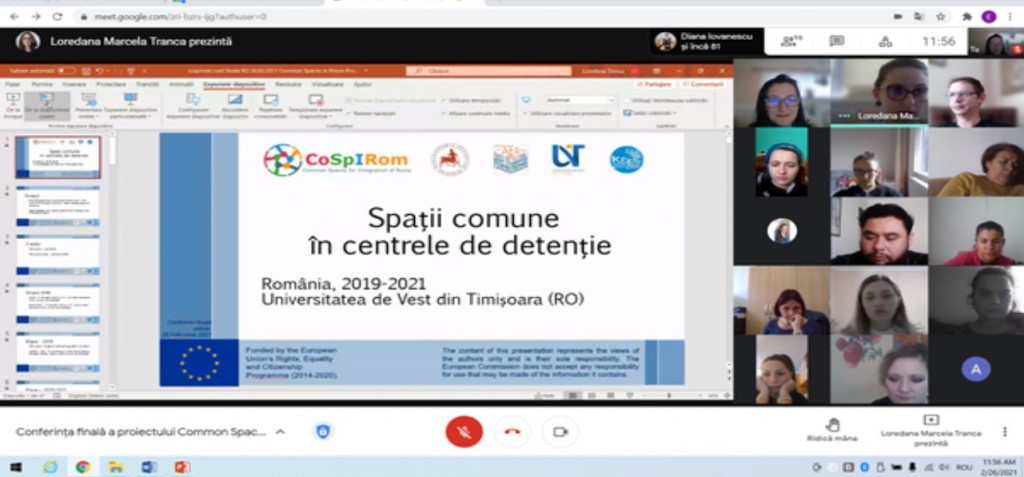
• Final Conference (February 2021):
On February 18th-19th the online final conference of CoSpIRom took place. It was organized by the University of Thessaly, and was attended by 216 people from the three partners’ countries. The conference gave the opportunity to participants to share their experience inside this partnership and to communicate the results to both stakeholders and to the broader society. The conference’s focus of the first day was on the Roma communities while the second day focused on common spaces in the prisons.

• Roundtable 2 (February 2021):
On February 22nd the Roundtable 2 that followed the final conference of CoSpIRom was organized, online, by the University of Thessaly and was attended by 27 people: research team and stakeholders, mostly from Greece since the original plan was for it to take place in Volos (Greece). In this meeting, the ideas and implemented actions of CoSpIRom were discussed. Each stakeholder commented on them in relation to the organization they represented. It was recognized that in both Roma community and in prison, important steps have been accomplished that meet CoSpIRom objectives and the demand of Roma integration. In addition, the evaluator connected the project’s ideas with current theories regarding issues of social inclusion. The need for continuity and expanding of this kind of actions in several levels as well as the need for synergy -development of local networking- emerged as the main point of the project’s accomplishment.

WHAT IS THE COSPIROM PROJECT:
The aim of CoSpIRom (Common Spaces for the Integration of Roma) project is the design and implementation of a series of actions against discrimination and marginalization of Roma in Greece, Romania and Italy. Creating common spaces of contact, spaces of acceptance and equal participation, we implement a critical communicative methodology aiming to involve all actors in decision-making in order to facilitate Roma’s integration and to raise awareness of the local societies in Greece, Romania and Italy. CoSpIRom aims to serve as a model for other European countries towards social justice and fighting for Roma communities’ rights to education and social and civic participation.

Funded by the European Union’s Rights, Equality and Citizenship Programme (2014 – 2020).
The content of this newsletter represents the views of the authors only and is their sole responsibility. The European Commission does not accept any responsibility for use that may be made of the information it contains.

